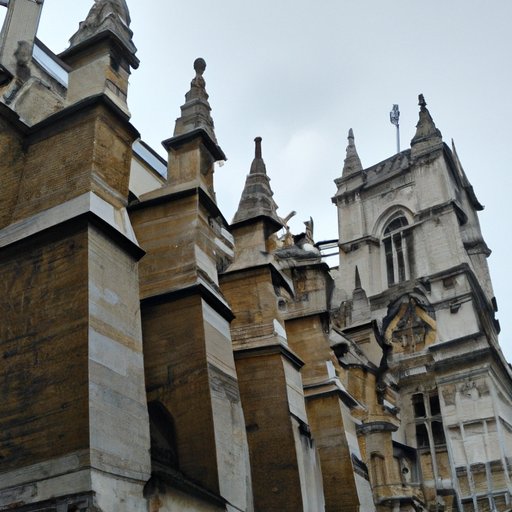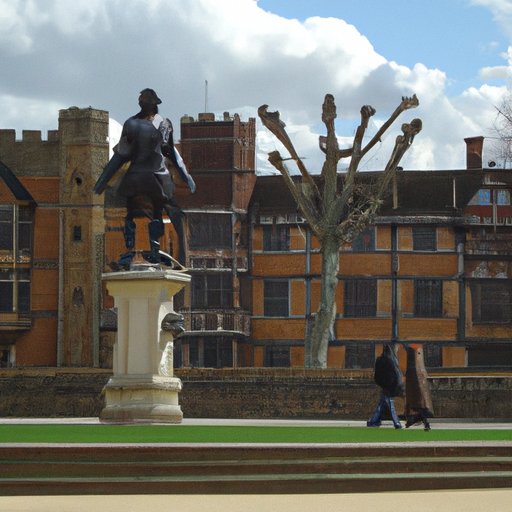Introduction
The Renaissance was a period of great cultural and intellectual change in Europe from the 14th to 17th centuries. During this time, advances were made in many areas of knowledge, including art, architecture, philosophy, science, and literature. In England, the Renaissance left an indelible mark on the culture and society, transforming it in many ways.

Impact of Renaissance Art and Architecture on English Culture
The Renaissance saw a rebirth of classical art and architecture in Europe, with artists and architects drawing inspiration from ancient Greek and Roman styles. This new style of art and architecture spread to England during the Renaissance and had a significant impact on English culture. Some of the most notable examples of Renaissance art and architecture in England include the works of artists such as Hans Holbein and Nicholas Hilliard, and the buildings designed by architect Inigo Jones.
The influence of Renaissance styles can be seen in the art and architecture created in England during this period. Artists began to incorporate elements of classical design into their artwork, while architects adopted classical proportions and ornamentation in their designs. This had a lasting impact on English art and architecture and can still be seen in the country today.

Role of Humanism in Shaping English Society
Humanism was an important movement during the Renaissance, with its focus on individualism and the power of human reason. Humanists placed great emphasis on education and sought to revive the study of classical literature and philosophy. This movement had a major impact on English society during the Renaissance, as it encouraged people to think critically about the world around them and to question the beliefs and customs of their society.
The humanist movement also helped to shape the development of English literature during this period. Writers such as William Shakespeare and Christopher Marlowe drew inspiration from the humanist ideals of the Renaissance, creating works that explored themes such as individualism, morality, and the nature of man. This had a lasting effect on English literature and continues to be felt today.
Influence of the Printing Press on the Spread of Ideas
The invention of the printing press in the 15th century had a profound impact on the spread of ideas during the Renaissance. The printing press allowed for the mass production of books, which meant that more people were able to access information and ideas than ever before. This had a huge impact on English culture, as it enabled the spread of new ideas and philosophies, such as humanism, throughout the country.
The printing press also enabled the dissemination of religious texts, which had a major impact on English society. This allowed for a greater understanding of religious teachings and provided people with access to a wider range of spiritual and philosophical beliefs. This had a significant impact on English culture and helped to shape the development of religious thought in the country.
Development of New Forms of Literature and Music
During the Renaissance, new forms of literature and music developed, such as the sonnet, the madrigal, and the masque. These new forms of art had a major impact on English culture, as they allowed for the expression of emotion in ways that had not been possible before. The popularity of these new forms of literature and music had a lasting impact on English culture and can still be seen today.
The emergence of these new forms of art also encouraged the development of other forms of artistic expression, such as theatre. This had a major impact on English culture, as it allowed for the exploration of new ideas and perspectives. This had a lasting effect on English society and can still be seen today in the country’s vibrant theatrical culture.

Influence of New Philosophical and Scientific Thinking on English Thought
The Renaissance saw the emergence of new philosophical and scientific thinking, with philosophers and scientists beginning to challenge traditional beliefs and question the nature of reality. This new way of thinking had a major impact on English society, as it encouraged people to explore new ideas and consider different perspectives. This had a lasting effect on English thought, as it helped to shape the development of science and philosophy in the country.
The new philosophical and scientific thinking of the Renaissance also had an impact on the arts. Writers and artists began to explore new ideas and themes, with works such as Shakespeare’s plays providing insight into human nature and questioning traditional beliefs. This had a major influence on English culture and can still be seen today in the country’s literary and artistic output.
Expansion of Trade and Maritime Exploration
The Renaissance saw a significant expansion of trade and maritime exploration, with European countries engaging in overseas exploration and establishing trading networks. This had a major impact on English culture, as it opened up new markets and opportunities for trade. This led to increased prosperity in England and helped to shape the country’s economy and society.
The expansion of trade and maritime exploration also had an impact on the arts, as it allowed for the spread of new ideas and influences from other cultures. This had a major influence on English culture and can still be seen today in the country’s diverse range of art and literature.

Transformation of Social and Political Structures
The Renaissance saw a transformation of social and political structures in England, with the rise of a powerful middle class and the establishment of representative institutions. This had a major impact on English society, as it gave more people a voice in government and allowed for more equitable distribution of resources. This had a lasting effect on English culture and can still be seen today in the country’s democratic system.
The transformation of social and political structures also had an impact on the arts. Writers and artists began to explore new ideas, such as democracy and freedom, in their works. This had a major influence on English culture and can still be seen today in the country’s literature and art.
Conclusion
The Renaissance had a profound impact on England and its culture. It brought about changes in art and architecture, humanism, the printing press, literature and music, philosophical and scientific thinking, trade and maritime exploration, and social and political structures. These changes had a lasting effect on English culture and can still be seen today in the country’s art, literature, and society.
(Note: Is this article not meeting your expectations? Do you have knowledge or insights to share? Unlock new opportunities and expand your reach by joining our authors team. Click Registration to join us and share your expertise with our readers.)
